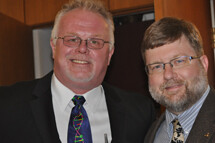
Speaking out against the death penalty
 BY MELISSA LAUBER
BY MELISSA LAUBER
UMCONNECTION STAFF
When Kirk Bloodsworth tells his story, he starts with the brutal murder of Dawn Hamilton, a nine-year-old girl with a pageboy haircut, who was found, in July 1984, murdered in the woods by her Baltimore County apartment. Police discovered her dead, lying on her stomach, naked from the waist down, her head bloody, her skull crushed.
Bloodsworth’s life is inextricably bound to Hamilton’s death. Without his knowledge or permission, it plunged him into a hellish nightmare. He became a suspect for her rape and murder, was convicted and sentenced to death in Maryland’s gas chamber. He lived behind bars for eight years, two of them on death row, in a cell no wider than the span of his arms.
In 1993, the DNA evidence proved what Bloodsworth had been proclaiming to anyone who would listen – he was an innocent man. He was released and pardoned.
Bloodsworth was the first death row inmate in the United States to be exonerated by DNA evidence. Today, he speaks out for the 140 who have been wrongly convicted and released, and for the others still awaiting their fate on death rows.
On Feb. 9, he spoke in the sanctuary of Trinity UMC in Prince Frederick, part of an event urging the faith community to speak up for legislation now before lawmakers that would repeal the death penalty and provide assistance to the families of crime victims.
In the church, he didn't hesitate to speak about the hell he endured. He shares stories of being locked up in Baltimore’s infamous Gothic penitentiary where, two weeks before he arrived, a guard was disemboweled by an inmate for a perceived insult. Believed to be guilty of a crime, “as ghastly as any murder could ever be,” he was “the most hated man in Maryland,” he said. The inmates repeatedly threatened his life.
One night, when the power went off in the prison, it was pitch black. The inmates began to set Bibles, Korans and other objects on fire. They threw things. Bloodsworth remembers things hitting him in the mouth and face. When the lights came on, his cell was full of a sea of cockroaches and he had to stuff toilet paper in his ears so that they wouldn’t crawl in and lay eggs.
“It was,” he said, “the closest thing to hell I ever felt in my life.”
Later, after his sentence was reduced to life in prison, he was moved to the penitentiary in Jessup, where he continued at every opportunity to assert his innocence and fight for his own release.
The murderer of Dawn Hamilton was eventually found. He had been a suspect during the initial investigation before police began to focus intently on Bloodsworth. Ironically, the man later lived in a cell, one floor down and a few over from Bloodsworth, who regrets not being able to put the pieces together in time to confront Hamilton’s killer.
At Trinity UMC , Bloodsworth shared with the ecumenical audience who gathered, the wisdom he learned from his mother to “Stand Up.”
His mother died months before Bloodsworth was released from prison. Shackled, he was allowed five minutes to view her body. On the way back to his cell, in a prison van, the refrain “stand up,” kept running through his head. “I strained at the chains,” he said. Laughing amid the tears, “I stood.”
Today, Bloodsworth stands up for justice, an advocate to repeal the death penalty. He rejects vengeance and revenge, for himself and for the state. “It doesn’t do me or anyone any good,” he said. “It will soil my soul if I continue to have hatred. What matters now is how I stand. I choose to do it with grace and dignity.”
Many United Methodists throughout Maryland, including Baltimore-Washington Conference legislative advocate Beth Reilly and Bishop John Schol, are working to have Maryland’s legislature repeal the death penalty in the state.
While Maryland has had a kind of de facto moratorium on executions since 2006, some are hopeful legislation bringing a full repeal of capital punishment will pass the state Senate and House of Delegates.
A recent Pew Research Center study found that 62 percent of Americans favor the death penalty for those convicted of murder. However, The United Methodist Church opposes it.
“The United Methodist Church cannot accept retribution or social vengeance as a reason for taking a life,” said Bishop Schol. “It violates our deepest belief in God as the creator and redeemer of humankind… United Methodists emphatically declare that we oppose capital punishment and urge its elimination from all criminal codes.”
At the event at Trinity UMC, Ricardo Wiggs also spoke. Wiggs and his wife Sharon were shot in their home in Clinton in 1992. Sharon died and Ricardo lived on to raise their daughters and become a leading voice for victims and victim survivors in Maryland.
In the death penalty legislation being considered this year, money will be set aside for the families of victims of violent crimes.
The man who wounded Wiggs and killed his wife were not found guilty in court. Sharing his and his family’s story, he rolls up his sleeve to show the scar where one of the bullets hit him. Below it is a tattoo that says “unforsaken.”
“It’s a statement of where I am in my life. I had to learn to find a level of acceptance. I had to learn to forgive. Life isn’t fair, you just deal with it. My life is not defined by where I’ve been. I have to say, ‘this is my life now, this is where I step from to move forward.’”
Both men are hopeful United Methodists will help the state of Maryland “move forward toward justice.”
For more information on the death penalty and efforts to repeal capital punishment in Maryland, visit www.Mdcase.org.

Login/Register to leave comment